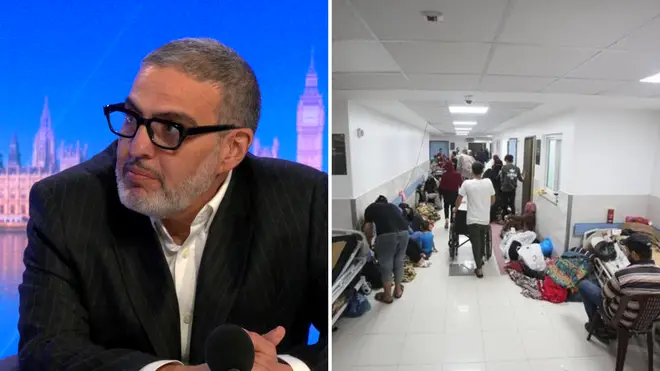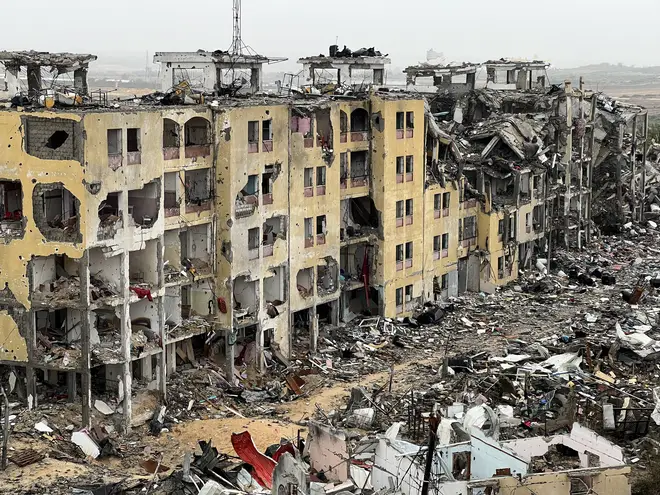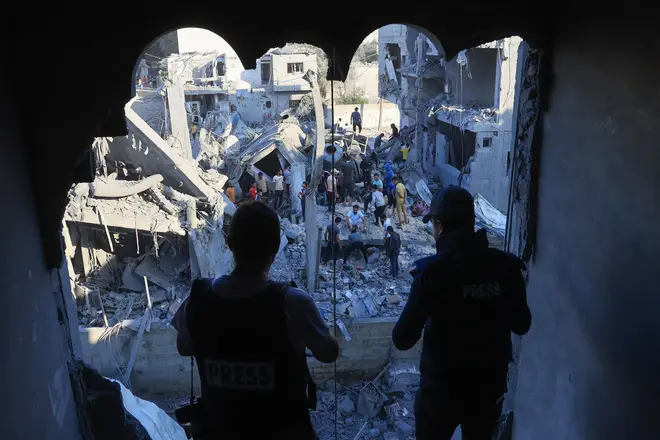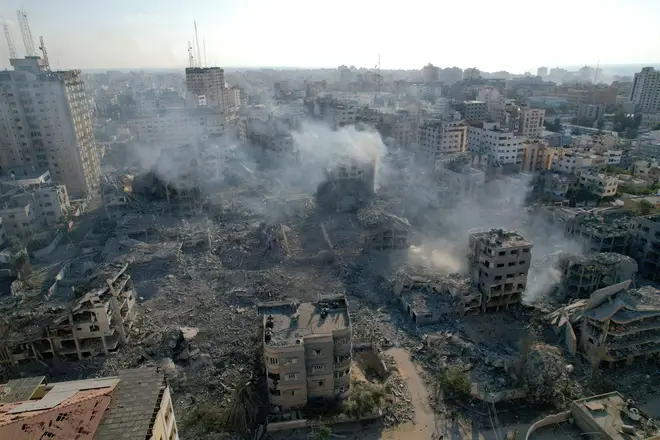
Vanessa Feltz 3pm - 6pm
27 November 2023, 19:21

A British-Palestinian doctor who worked for weeks in a hospital in Gaza has compared the conditions in the territory to the First World War.
Dr Ghassan Abu-Sittah told LBC's Andrew Marr that staff at the hospital were having to give paracetamol to patients after surgeries. He said that doctors were using ketamine to knock patients out, but even that ran out eventually.
Dr Abu-Sittah, who worked at both al-Shifa and al-Ahli Hospitals, also claimed to have used washing up liquid to clean patients' wounds, such were the shortages.
Foreign governments and aid organisations have been trying to get supplies into Gaza since Israel's bombardment and invasion began, as charity workers have told of a humanitarian catastrophe.
Read more: Israel-Hamas ceasefire 'extended for two more days', as more hostages set to be released

Dr Ghassan Abu-Sitta speaks to Andrew Marr on his return from Gaza
Dr Abu Sittah, a plastic surgeon, said: "The whole of the bed capacity of Gaza was 2,500 and you ended up with 35,000 wounded. And so we were running out of things on a daily basis, it became more and more difficult.
"Initially, it was antiseptic solution, and I went out and bought some washing up liquid and some vinegar to clean the wounds with. And then by the end, we had run out of anaesthetic and ketamine, which is, you know, a horrible veterinarian drug".
But "it will allow you to put the patient to sleep without an anaesthetist," he added.
"But even at the end, the last few weeks we were doing without it. There was no morphine and we were having to give paracetamol to patients after their surgeries as a pain relief. And we were doing dressing changes on children with no anaesthetic and no analgesic.

"By the end. It turned into a kind of almost like a horror scene. And because I was because I knew the history of early and First World War history early it was as if, at one stage, I thought, this place is stuck in time. It's the same conditions that existed during these wars."
Israel and Hamas have been fighting for seven weeks, since Hamas launched its raids into southern Israel, killing 1,200 and taking about 240 hostages back into Gaza. Some 14,800 Palestinians have been killed in the ensuing Israeli bombardment and ground invasion, Gaza health authorities have said, with hundreds of thousands more displaced.
The two sides called a four-day truce on Friday to release hostages and let aid into Gaza. The truce was extended until Wednesday on Monday.
Dr Abu-Sittah said: "It's absolutely critical that that the killing stops and the wounding stops so that those who are their wounded, get some treatment. But what's more important is that the hospitals are rehabilitated. I mean, there's tens of thousands of patients that need surgery, otherwise their wounds will be infected, and they will die as a result of these wounds."
Dr Abu-Sittah, who recently returned to London from Gaza, said that there were days when he thought he might die himself.

"There were nights when I went to sleep, and the bombing was so close to the hospital that I thought that was the end of us," he said. "I'm glad that I'm back.
"I'm glad that my kids are with me, but just overwhelmed by a sense of sadness for the patients that I wasn't able to help and the patients that I've had to help but still need more care.’
Asked if he feels guilty for leaving his patients, Dr Abu-Sittah said: "Absolutely. You see, you know them, and you remember them.
"The way we're trained in this country, both in the medical schools and the NHS, there's a level of ownership that you have towards your patients, when you come up the ranks from medical school, to train a doctor, to consultant that you never shake and forever they will be my patients and forever I will have a sense of responsibility to see them through."

The doctor said he had been contacted by British police to be interviewed as a potential victim of a war crime in the blast at the Al-Ahli hospital. Israel and the US have both denied they were responsible for the strike on the hospital, which they have blamed on a misfired rocket by Palestinian militants.
LBC has contacted the Metropolitan police for comment.
He added: "As a parent, if the world sweeps [the attacks] under the carpet, the world that we will be living in is a frightening place.
"For] the sheer number of children who have been killed, there has to be some justice done for these children. And for us to be able to re-establish what has been established after the Second World War, which are agreed principles by which wars are conducted".
Dr Abu-Sittah also claimed that Israel had used white phosphorus in its attacks on Gaza, a weapon that is used to badly burn its victims. He said he recognised the kind of terrible burns on patients he was treating.
Amnesty International and Human Rights said that they had analysed video footage that showed the Israeli army had used white phosphorus.
Israel has vehemently denied using it. LBC has contacted the Israeli government for further comment.